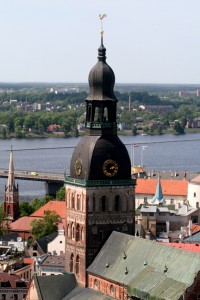
Riga's Old Town is a UNESCO World Heritage Site and contains the largest church in the Baltics, the Riga Cathedral. Photo by Nathan Greenhalgh.
RIGA — The panel responsible for selecting the European Capital of Culture for 2014 recommended that the title be awarded to Latvia’s historic capital of Riga, which will share the honor along with Umeå, Sweden.
Latvia had already been designated as the host country for 2014 by the European Union in 2006, but the city was not decided until Monday. Cēsis and Liepāja were also contenders.
“I am delighted with Riga’s success and would like to congratulate the local authorities and the team that prepared the application. Riga has great potential for being the European Capital of Culture. Bearing this title for one year will certainly place this city in the spotlight and create enormous potential for it to develop locally and raise its profile across Europe,” Ján Figel’, the European Commissioner of Education, Training, Culture and Multilingualism, said in an EU press release.
Riga will be the third Capital of Culture in the Baltic states. Vilnius is one of this year’s capitals, while Tallinn will hold the title in 2011.
Preparation, preparation
While the award is considered prestigious and an excellent economic opportunity, there’s no guarantee the Capital of Culture designation will give a city financial dividends. Vilnius has actually seen a decrease in tourists from last year.
“Success will not be automatic; to benefit fully, Riga will have to develop its program for 2014 and be given all the political and economic support needed,” Figel’ said.
The Riga municipal government has vowed to take on some of the city’s nightclubs that have become infamous for luring tourists into paying exorbitant bills with attractive women and violence. Latvian airBaltic recently launched a taxi service whose stated intention is to provide visitors with honest taxi rates instead of ripoffs.
“We will start work tomorrow, and with this status Riga will gain five years to advertise in the East and in the West,” Riga’s mayor Nils Usakovs told DPA. Before the designation was announced Usakovs trumped the importance of tourism for the city’s economy in many speeches.












